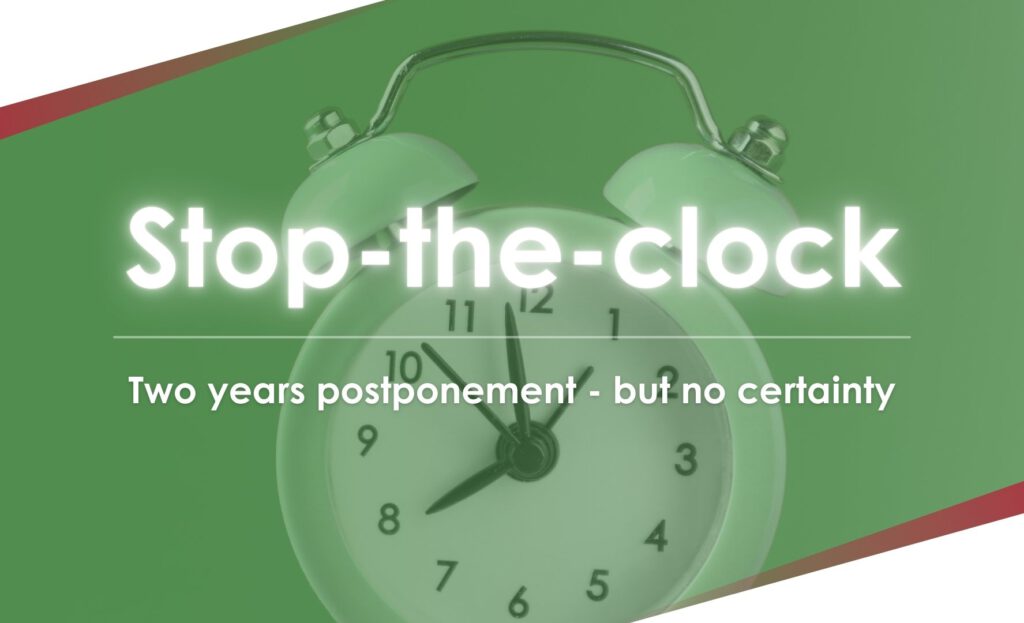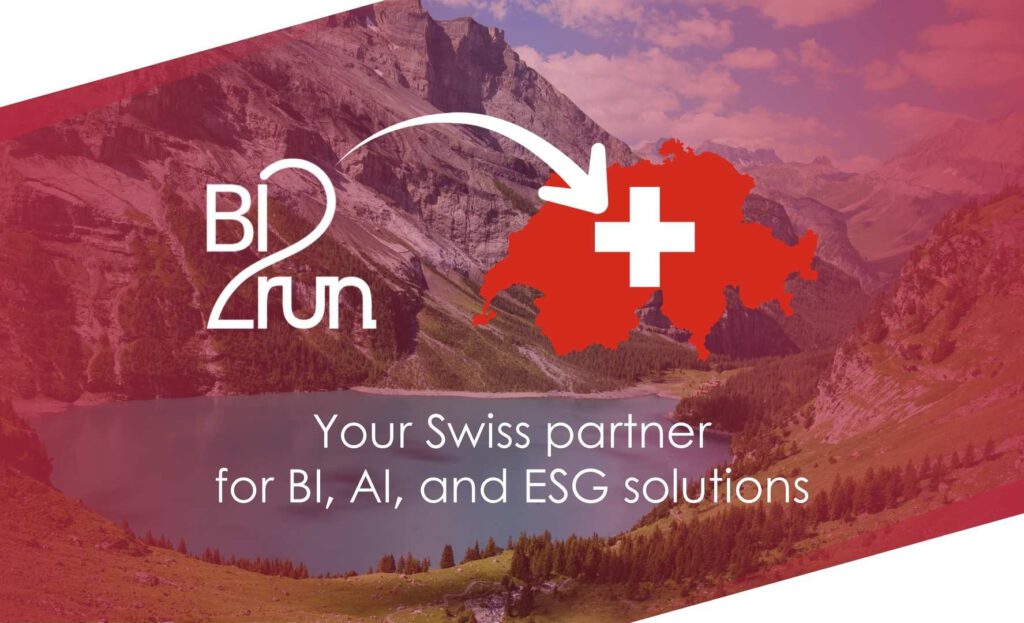On April 3, 2025, the European Parliament approved the so-called stop-the-clock proposal – with a clear majority: 531 votes in favor, 69 against and 17 abstentions. The decision is part of the larger omnibus package to ease the burden of EU regulations on companies. The aim: a two-year postponement of the next CSRD application wave.
What does that mean?
At first glance: a breathing break for many companies. At second glance: many new questions – and above all, no real legal certainty.
Because even if the Brussels headline sounds like clarity: In practice, there is uncertainty.Many companies have long since started implementation. And now? Take a break? Carry on? Wait for national laws?
We assess what this political quick fix really means – and what needs to be done now.
What was decided – and who is affected?
With the so-called stop-the-clock proposal, the EU Commission wants to give companies two years more time before they have to report in accordance with the new requirements of the Corporate Sustainability Reporting Directive (CSRD) for the first time.
Specifically, this affects all companies that were not already required to report under the old NFRD – i.e. large “Wave 2” companies and listed SMEs (“Wave 3”). These deadlines have now been pushed back.
Here is the new overview:
| Group | Previous start | New start (after stop-the-clock) |
| Large companies with NFRD obligation (“Wave 1”) | Financial year 2024 → Report 2025 | Unchanged |
| All other large companies (“Wave 2”) | Financial year 2025 → Report 2026 | New: Financial year 2027 → Report 2028 |
| Listed SMEs (“Wave 3”) | Financial year 2026 → Report 2027 | New: Financial year 2028 → Report 2029 |
That sounds like a relief at first – especially for companies that are still in the middle of preparations. But for companies in Wave 1, everything remains as planned.
That means very practical:
- If you are already subject to NFRD, you must deliver now.
- If you belong to Wave 2 or 3, the launch has been postponed by two years – but with no guarantee as to what the final rules will look like by then.
And that brings us to the crux of the matter.
Legal certainty? Unfortunately not.
The official communication speaks of “more legal certainty” and “predictability” for companies. But if you take a closer look, it becomes clear that the clock may have stopped – but the uncertainty has not.
Because it is currently unclear:
- What exactly applies to companies that have already started?
Many have long since set up reporting projects, established internal processes or commissioned external consultants. Should they pause now? Or continue voluntarily, even though the rules could change again soon? - What will happen to the ESRS standards?
The EU Commission has commissioned EFRAG to revise the European Sustainability Reporting Standards – a draft should be available by October 31, 2025. It is to be expected that much of the content will be simplified or deleted. This means that those who currently work according to the old standards could be investing twice. - What is the situation in Germany?
The national implementation of the CSRD is still pending. For Wave 2 companies, there is – as of today – no legal obligation to report for 2025. - It remains to be seen whether and when the German legislator will adopt the new deadlines. The only thing that is clear is that companies have long been planning on the basis of the original timeline – and are now left in a vacuum.
- And what about investors and stakeholders?
Those who had hoped that CSRD would finally provide them with standardized, comparable ESG data will have to keep waiting. For many investors, the data basis – and thus the entry into truly ESG-based management – is shifting once again.
Our conclusion at this point:
The resolution formally stops the reporting obligation – but not the confusion in which many companies currently find themselves.
How did it come to a halt – and why so quickly?
It is rare for an EU law to rush through the Commission, Council and Parliament in less than six weeks. The stop-the-clock proposal went unusually quickly – and that is no coincidence.
The political pressure was high – from several directions:
- Economy & Member States:
As early as autumn 2024, several member states – above all France, Italy and Germany – called for tangible relief for companies. The so-called “Budapest Declaration” was a wake-up call: less bureaucracy, more competitiveness. - The Commission delivered promptly:
On February 26, 2025, it presented the so-called omnibus package. The centerpiece: the proposal COM(2025) 80 – the “stop-the-clock”. The aim is to give companies breathing space by postponing the CSRD obligation for two years. - The Council was immediately on board:
COREPER (Committee of Permanent Representatives to the Council) already approved the proposal on March 26, 2025. This made it clear that the Council of Ministers would also wave it through. - Parliament followed suit – albeit not entirely smoothly:
On April 1, 2025, Parliament voted to deal with the proposal as a matter of urgency.The vote was close: 427 in favor, 221 against, 14 abstentions – which shows how controversial the issue was. Two days later, on April 3, the final vote followed: 531 MPs voted in favor, 69 against and 17 abstained – a clear result.
Why did it happen so quickly?
Because everyone knew that if the postponement was to take effect in 2025, it had to be decided before the summer.
And because there was a broad political consensus behind the scenes: the CSRD in its current form cannot be implemented in the economy – at least not for everyone.

What does this mean in concrete terms for companies?
The political decision has been made – but nobody in the company stops working. Most sustainability, finance and compliance teams are now faced with exactly one question:
And now? Carry on or stop?
1. If you belong to Wave 1:
- You are reporting for the 2024 financial year – no ifs, ands or buts.
- You need ready-made CSRD-compliant sustainability reporting by 2025, including application of the full ESRS.
- You are not affected by the postponement.
Tip: Stay tuned – especially now that many others are putting on the brakes, you will be at a benefit with a functioning reporting process.
2. If you belong to Wave 2 or 3:
You have gained more time – but less orientation.
- Your statutory reporting obligation begins for the 2027 financial year at the earliest.
- You do not currently know what the revised ESRS standards will look like.
- National implementation laws (e.g. in Germany) are still completely lacking.
Obligation? No. Recommendation? That depends.
❗️The problem is that many companies have long since invested.
Tools have been purchased, data paths defined, workshops held. An immediate stop would make no business sense – and would be strategically risky.
3. What makes sense now:
- Don’t stop the CSRD project – but scale it up.
Consider together with stakeholders: Which parts are worth continuing? What can you freeze temporarily? - Securing knowledge and structures.
Keep internal expertise in the team, document processes, ensure initial reporting iterations – even if these remain “voluntary”. - Improve data quality.
Use the lead time gained to close data gaps. Nothing is more frustrating than starting 2027 with the same problems as 2024. - Communication & expectation management.
Listed companies or those with investor contact in particular should make it clear:
“We are not taking a break – we are using the time for better quality.”
In short:
You do not have to report (yet). But you should be wise with the delay. If you stop everything today, you will lose out tomorrow.

What happens now – and how do you get through this phase safely?
Even if the legal text has not yet been finalized, the political course is clear:
- The two-year postponement of the reporting obligation is coming.
- The standards (ESRS) are being revised.
- National implementation, e.g. in Germany, is still pending – but is only a matter of time.
What this means: Now is not the time for standstill – but for structured control. And this is exactly where we support you.
What companies need now:
- A clear classification: Does the reporting obligation apply – or not?
- A robust plan for dealing with ongoing CSRD projects.
- Flexibility to be able to react quickly to new requirements.
- A partner who provides orientation – and at the same time helps with implementation.
How we support you specifically:
- We work with you to assess where your CSRD project currently stands – and how it can be sensibly continued.
- We prioritize with you what you should pause, streamline or even expand.
- We keep our finger on the political and regulatory pulse – and prepare your organization specifically for the next wave of reporting.
- We work with you to develop solutions that will continue to work with new standards – scalable, adaptable, legally compliant.
Conclusion: The postponement is not an exit – but a time window.
Companies that react wisely now will give themselves a head start.
We will help you to make the most of this window of opportunity – without being overwhelmed, but with an eye for the essentials.
Get in touch with us – we’ll take the next steps together.








